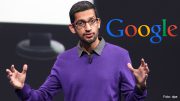If you saw the ‘Made by Google’ hardware event on 4 October, one term that was the underlying leitmotif was artificial intelligence. Every hardware product announced, from the humble Google Home Mini speaker to the Pixelbook to the Pixel 2 XL to even the snap on Google Clips camera, had AI as its major component. It has been a couple of years now since Google CEO Sundar Pichai has been saying on stage that he wants Google to be an ‘AI-first’ company. At the Made by Google event last night, this aspect was reiterated.

Google CEO Sundar Pichai. Reuters.
AI process
In an interaction with The Verge, Pichai spoke about how AI processing is moving from the cloud to on-device. Google Clips, a small camera which captures 7-second moving images using AI is an example. According to Pichai, using a hybrid approach to AI is necessary and makes absolute sense. “We will thoughtfully invest in both. Depending on the context, depending on what you’re dealing with, it’ll make sense to deploy it differently,” he said.
Over the last couple of years, Google has aggressively launched many hardware products, across categories. This year saw some more additions. According to Pichai, the hardware products are also a means to integrate AI better. For Pichai, integrating AI with every hardware product Google makes, is high on the priority list, as he feels it will be tough to drive the future of computing otherwise.
In his keynote at the hardware event, Pichai spoke about how Google Maps was using AI and machine learning to map certain parts of Lagos, which is a city that is constantly changing. Another example cited was how Google Maps has added the ability to find a parking spot near your destination using AI.
“I think we will all interact with [our devices] in more conversational, sensory ways: using voice, vision, and other things. That’s important to me,” said Pichai.
But when one talks about Google, the concerns around privacy come along with it. Considering Google knows so much about you, what about AI’s role in securing privacy?
According to Pichai, AI could help with that as well, as the system can get more intelligent about understanding what is sensitive information for the users, as the AI understands the context better. For instance, health-related information should be treated differently than say looking for restaurants to eat in, says Pichai.



Be the first to comment on "Sundar Pichai :Integrating artificial intelligence to rethink hardware products Sundar Pichai"